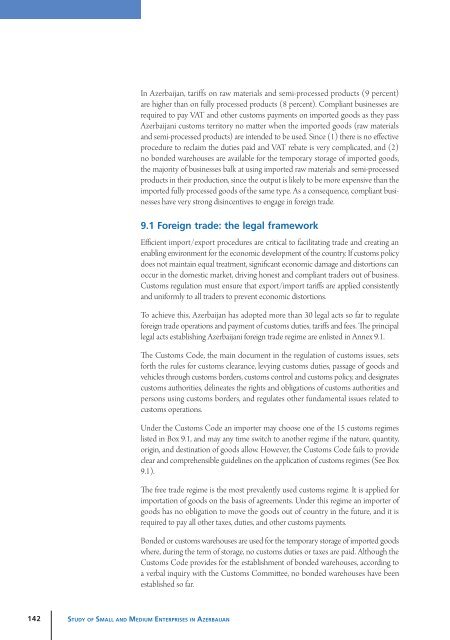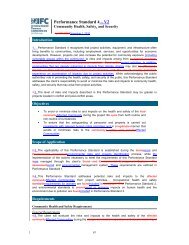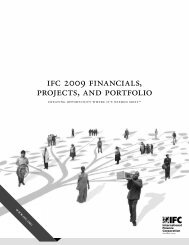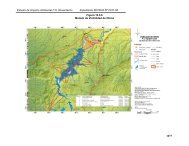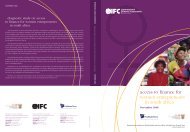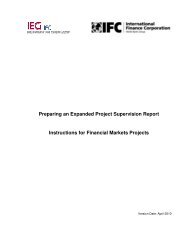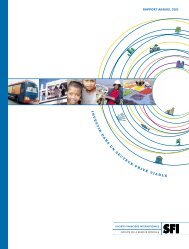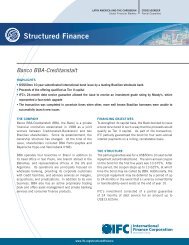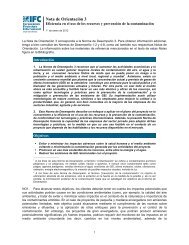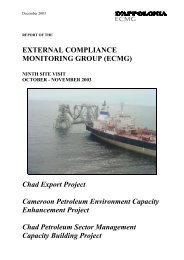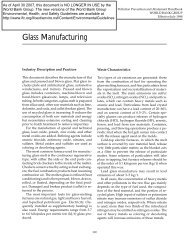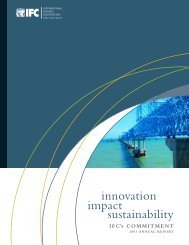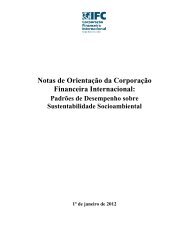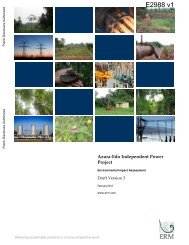Study of Small and Medium Enterprises in Azerbaijan - IFC
Study of Small and Medium Enterprises in Azerbaijan - IFC
Study of Small and Medium Enterprises in Azerbaijan - IFC
Create successful ePaper yourself
Turn your PDF publications into a flip-book with our unique Google optimized e-Paper software.
In <strong>Azerbaijan</strong>, tariffs on raw materials <strong>and</strong> semi-processed products (9 percent)<br />
are higher than on fully processed products (8 percent). Compliant bus<strong>in</strong>esses are<br />
required to pay VAT <strong>and</strong> other customs payments on imported goods as they pass<br />
<strong>Azerbaijan</strong>i customs territory no matter when the imported goods (raw materials<br />
<strong>and</strong> semi-processed products) are <strong>in</strong>tended to be used. S<strong>in</strong>ce (1) there is no effective<br />
procedure to reclaim the duties paid <strong>and</strong> VAT rebate is very complicated, <strong>and</strong> (2)<br />
no bonded warehouses are available for the temporary storage <strong>of</strong> imported goods,<br />
the majority <strong>of</strong> bus<strong>in</strong>esses balk at us<strong>in</strong>g imported raw materials <strong>and</strong> semi-processed<br />
products <strong>in</strong> their production, s<strong>in</strong>ce the output is likely to be more expensive than the<br />
imported fully processed goods <strong>of</strong> the same type. As a consequence, compliant bus<strong>in</strong>esses<br />
have very strong dis<strong>in</strong>centives to engage <strong>in</strong> foreign trade.<br />
9.1 Foreign trade: the legal framework<br />
Efficient import/export procedures are critical to facilitat<strong>in</strong>g trade <strong>and</strong> creat<strong>in</strong>g an<br />
enabl<strong>in</strong>g environment for the economic development <strong>of</strong> the country. If customs policy<br />
does not ma<strong>in</strong>ta<strong>in</strong> equal treatment, significant economic damage <strong>and</strong> distortions can<br />
occur <strong>in</strong> the domestic market, driv<strong>in</strong>g honest <strong>and</strong> compliant traders out <strong>of</strong> bus<strong>in</strong>ess.<br />
Customs regulation must ensure that export/import tariffs are applied consistently<br />
<strong>and</strong> uniformly to all traders to prevent economic distortions.<br />
To achieve this, <strong>Azerbaijan</strong> has adopted more than 30 legal acts so far to regulate<br />
foreign trade operations <strong>and</strong> payment <strong>of</strong> customs duties, tariffs <strong>and</strong> fees. The pr<strong>in</strong>cipal<br />
legal acts establish<strong>in</strong>g <strong>Azerbaijan</strong>i foreign trade regime are enlisted <strong>in</strong> Annex 9.1.<br />
The Customs Code, the ma<strong>in</strong> document <strong>in</strong> the regulation <strong>of</strong> customs issues, sets<br />
forth the rules for customs clearance, levy<strong>in</strong>g customs duties, passage <strong>of</strong> goods <strong>and</strong><br />
vehicles through customs borders, customs control <strong>and</strong> customs policy, <strong>and</strong> designates<br />
customs authorities, del<strong>in</strong>eates the rights <strong>and</strong> obligations <strong>of</strong> customs authorities <strong>and</strong><br />
persons us<strong>in</strong>g customs borders, <strong>and</strong> regulates other fundamental issues related to<br />
customs operations.<br />
Under the Customs Code an importer may choose one <strong>of</strong> the 15 customs regimes<br />
listed <strong>in</strong> Box 9.1, <strong>and</strong> may any time switch to another regime if the nature, quantity,<br />
orig<strong>in</strong>, <strong>and</strong> dest<strong>in</strong>ation <strong>of</strong> goods allow. However, the Customs Code fails to provide<br />
clear <strong>and</strong> comprehensible guidel<strong>in</strong>es on the application <strong>of</strong> customs regimes (See Box<br />
9.1).<br />
The free trade regime is the most prevalently used customs regime. It is applied for<br />
importation <strong>of</strong> goods on the basis <strong>of</strong> agreements. Under this regime an importer <strong>of</strong><br />
goods has no obligation to move the goods out <strong>of</strong> country <strong>in</strong> the future, <strong>and</strong> it is<br />
required to pay all other taxes, duties, <strong>and</strong> other customs payments.<br />
Bonded or customs warehouses are used for the temporary storage <strong>of</strong> imported goods<br />
where, dur<strong>in</strong>g the term <strong>of</strong> storage, no customs duties or taxes are paid. Although the<br />
Customs Code provides for the establishment <strong>of</strong> bonded warehouses, accord<strong>in</strong>g to<br />
a verbal <strong>in</strong>quiry with the Customs Committee, no bonded warehouses have been<br />
established so far.<br />
142<br />
St u d y o f Sma l l a n d Me d i u m Ent e r p r i s es <strong>in</strong> Az e r b a i j a n


